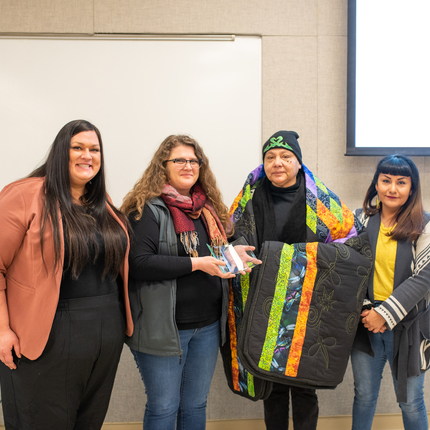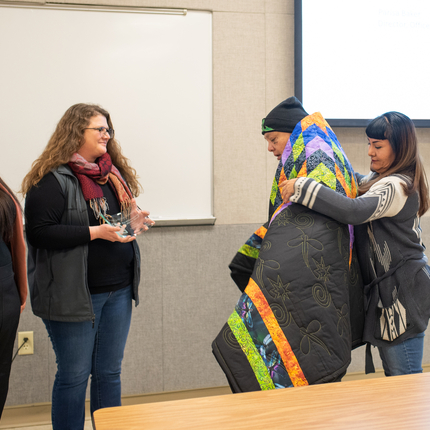Community leaders come in all forms—from young go-getters to seasoned professionals, and everything in between. The one thing they all have in common is their dedication and passion for making their hometowns the best places they can be, and helping their neighbors in whatever ways they can.
LaVonne Snake of Winnebago, Nebraska, epitomizes every part of being a true leader and is changing lives in northeast Nebraska Native communities. She teaches classes at Nebraska Indian Community College (NICC) on edible foraging of wild plants, nutrition, and culinary know-how. In addition, she leads a Baking for Business workshop series, a partnership between the Center for Rural Affairs and NICC.
She grew up around food and cooking at family gatherings, and her passion for the culinary arts started when she was young. She took her interest to the next level by moving to Minneapolis to attend culinary arts school to become a gourmet chef. Her experience there opened her eyes and exposed her to the many spectrums of the world of food.
“I trained under a chef whose restaurant had menu items from all over the world, and customers could order $100 bottles of wine,” said LaVonne. “But, at the same time, my mother and sister worked and cooked at Indian survival schools in the Twin Cities. They told me stories about kids coming to school just so they could eat. That really affected me, seeing such prosperity on one side, then seeing members of my own community struggling. I couldn’t come to terms with it.”
LaVonne was there for her father as he struggled with his health and faced the hardships of dialysis. She also witnessed other family members battle health issues, herself included, as a diabetic. LaVonne wanted to pass along her knowledge to the people in her community so they could not only survive, but thrive.
“I realized what we really needed was our traditional food,” she said. “Twenty years ago I went back to school, and I set up a research model to gather data. That's why I know we need to pass along traditional knowledge—the answer is in the food.”
Through her research, LaVonne found that many of our natural food sources are contaminated, and she’s doing her part to educate those around her. For the past several years, LaVonne has brought her findings to the extension classes she teaches for the community at NICC, as well as to the rotating schedule of classes for the college students.
“We need to make our traditional food clean again,” she said. “‘Forever chemicals’ are now in every fresh water source in the U.S.—lakes, ponds, streams, and rivers. I want to address that with my people, and return to a Native diet. I don’t want to recommend eating contaminated things, I want them to eat and grow clean foods. I want to teach them about our carbon footprint, so we can have clean food and water.”
In addition to teaching about traditional foods and gardening, LaVonne tries to add in different aspects of ethnobotany—the study of how people of a particular culture and region make use of indigenous, or native, plants— to her courses. She is also working on a beekeeping project on the NICC campuses in Macy and Santee, Nebraska.
“As we’ve been trying to raise fruit trees on campus, I realized beekeeping is an important contribution to the success of that part of the garden,” said LaVonne.
Along with her colleagues, she is working on designating a place for an apiary on both campuses, as well as tending to a prairie restoration project that has been ongoing for the past 12 to 15 years.
LaVonne enjoys her work, and hopes her students attending NICC and from the community get more than educational knowledge from her classes and workshops.
“I just want people to realize their part in everything,” she said. “That they are part of everything, and know their part in it, and to take some kind of forward action in that.”
Because of her work with nutrition education, and her passion for promoting educational opportunities in her community, LaVonne was chosen to receive the 2022 Center for Rural Affairs Rural Community Champion Award.
This award is given to LaVonne for making extraordinary contributions in building engagement within her own communities around nutrition education and food sovereignty.
“LaVonne offers her skills and traditional knowledge to all with a humble spirit,” said Kristine Flyinghawk, Native communities manager with the Center. “She demonstrates living virtuously through her teaching, whether it be students in her classes, workshop attendees, or other community events. Her passion to help community members and students make lifestyle changes through nutrition and living through Mother Earth is evident in all she does.”
LaVonne’s mother, Laura Whitewing, is a founding staff member of the Center. Growing up, LaVonne says she was exposed to her mother’s work, and learned the importance of working together to accomplish goals. And while she feels commercial ag practices have much to do with current food source contamination issues, she does what she can to collaborate and cooperate with those around her to make the situation better, one step at a time.
“I follow my mother’s example,” she said. “Sometimes we have to keep focused on our goal and set aside our personal feelings to offer the services we want to provide and to make sure they get accomplished.”
Her family and its history factors into everything LaVonne has been able to do for the people around her. She is grateful to them for guiding her to where she is today.
“I want to recognize my mother and grandmother for teaching me about food, food sources, and growing foods,” she said. “My father taught me to be a servant to the people. In my Tribe, I’m a member of the Snake Clan. In my position, we are servants to our people, but also, on the other side, we can ask anyone for help. There’s always that balance, that equity there. And I don’t think of myself as just a servant to someone. I am part of all of this. In my Tribe, in my place, that is part of our teaching, to be that humble servant.”
Feature photos: LaVonne was presented with the Rural Community Champion Award and a Native star quilt on Feb. 24, 2023, at NICC in Macy. Pictured from left are Kristine Flyinghawk, Native communities manager; Sandra Renner, Farm and Community director; LaVonne; and Angelina Magerl, community associate and LaVonne's daughter. | Photo by Kylie Kai





